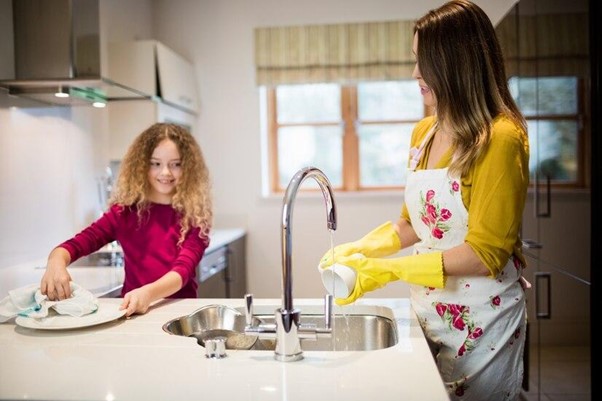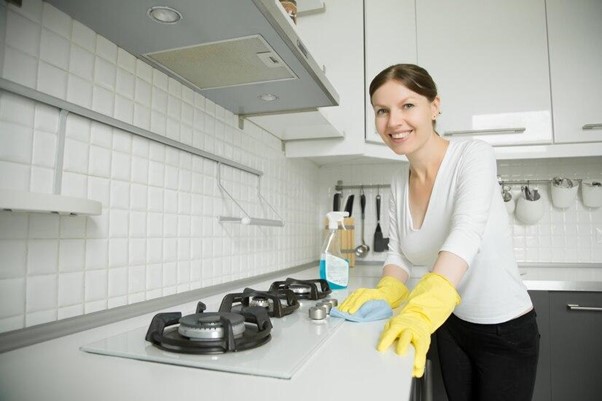10 Basic Kitchen Hygiene Rules to Follow
Why is it important to keep your kitchen clean and sanitary?
The kitchen is the beating heart of our home, where the entire family's wonderful meals are prepared and shared to meet their daily dietary requirements. As the kitchen is one of the germiest places if it is not cleaned or kept clean.
So, keeping the kitchen and all of its equipment clean is critical for a hygienic and germ-free home. As a result, we have developed ten rules for hygiene in the kitchen to follow in order to live a healthy life.
10 Importance of Kitchen Hygiene Rules
- Thoroughly wash your hands before and after handling food, as well as after using the restroom, sneezing, or coughing. Remember to wash your hands for at least 20 seconds to get rid of germs.
- Sanitize and clean all surfaces and equipment used during food preparation. Countertops, cutting boards, cutlery, knives, gloves, cookware, and so on. To clean them, use hot soapy water or food-grade sanitizer on a daily basis to sterilize them adequately.
- Prevent cross-contamination before infecting your complete family, for example, for raw meat and vegetables, use different cutting boards, utensils, and knives, or clean them well after each use. Also, while preserving meat and vegetables, keep them separate or, at the very least, cover them carefully to avoid contamination. These would be followed by raw meat, poultry, and fish from various sources.
- Cook food at the correct temperature to destroy dangerous bacteria found in meats and non-vegetarian foods. Even for veg meals, make sure to cook at a temperature where bacteria are eliminated, so you don't consume any food that hasn't been thoroughly cooked, which could lead to food poisoning or other health problems.
- Store the food with right temperature after purchasing or preparing, store the food at the proper temperature. Food poisoning increases if the temperature is kept between 40°F (4°C) and 140°F (60°C), according to food safety. As a result, keep your refrigerator at 40°F (4°C) or lower and your freezer at 0°F (-18°C) or below. This will help you keep healthy food every time.
- Wash fruits and vegetables under running water before eating or cooking with them. Try to do it once you buy it from the market and wash and store it; this will assist you in not running out of time when you need to cook or consume it. At the same time, this practice will preserve your prior fruits and vegetables free of contamination from the recent buy.
- Do not reuse filthy dishcloths or sponges; according to a study, kitchen sponges contain the most germs. So, after every use, clean it well with hot water and disinfectant treatments, and completely dry it.
- Keep your kitchen clean and clutter-free to prevent bugs and rodents from breeding in your kitchen and affecting your family's health. After using each piece of kitchen equipment, return it to its original spot and leave the kitchen clean and clutter-free.
- Avoid touching your face, hair, or other body parts in the kitchen, as this might be another source of germs in your food. Also, wear a hair net or tie your hair properly to prevent hair from falling into your food.
- Pets have furry hair, which is the most convenient way for their fur to fall into the food or in the kitchen area and cause your kitchen to succumb to bacteria.
Importance of Personal Hygiene in the Kitchen
Personal hygiene in the kitchen is more than just keeping your hands clean; it is an overall practice that offers you and your entire family a wonderful nutritious diet every time. If you retain adequate hygiene in your kitchen area, you are already putting your inner health in a stronger direction to deal with any illness that may arise from the outer health. Because internal health problems can be the most dangerous illness to cope with.
So, if your kitchen spaces are clean and tidy, you will have the most powerful weapon in your cells to fight off any future disasters. Overall, the kitchen is the best place to protect your family's and your own health from illness.
What are some common kitchen hygiene mistakes?
There are several kitchen hygiene blunders that we make on a daily basis; here are a few examples:
- We fail to thoroughly clean our hands.
- Using the same cutting boards for raw foods of every kind of food.
- Failing to monitor the temperature to ensure that our food is cooked safely.
- Allowing leftover food to sit out for an extended period of time.
- Failure to prevent cross-contamination between vegetarian and non-vegetarian foods.
- Failure to keep the kitchen space clean and clutter-free at all times.
- Forget to clean the kitchen sponges and clothing on a regular basis.
- Using soiled utensils and kitchenware.
- Underestimate the importance of properly storing food.
- Failure to clean the stove knobs.
Tips for Keeping Your Kitchen Clean and Hygienic
Here are some tips to help you maintain your kitchen clean and hygienic:
- Make a routine: Make a schedule to clean your kitchen. It can be daily or weekly tasks, which will help you not leave a single corner unclean.
- Quality Cleaning Products: It is critical to ensure that while you are cleaning the kitchen, you are using the best and most effective product to clean it, as well as to kill and reduce the germs in the kitchen.
- Organize your kitchen: A messy kitchen increases the likelihood of bacteria in the kitchen being spread. So organize your kitchen such that it is easy to operate in it while still keeping it clean.
- Teach everyone: From kids to elders, teach everyone the basic cleanliness principles to follow so that bacteria never have a chance to develop in your kitchen.
How can I educate my family and kitchen staff about the importance of personal hygiene in the kitchen?

This is the most critical aspect of having a healthier family and remaining healthy and germ-free in the future. If you are the only one who maintains hygiene, but your family members or kitchen staff do not, it will be impossible to keep your kitchen germ-free. Here are some tips to teach your family or kitchen workers about maintaining personal hygiene in the kitchen.
- Discuss the importance of hygiene and staying healthy and germ-free with them. So that everyone who enters the kitchen can maintain the necessary hygiene to keep the kitchen germ-free.
- Show them how to be sanitary in the kitchen. Allow them to understand the process of cleaning the food, storing it, handling it, and so on while providing them with food safety and sanitary training.
- Encourage them to follow good hygiene habits such as not touching their bodies or hair, washing their hands after sneezing or coughing, and so on.
- Teach them the significance of washing their hands for at least 20 seconds before handling food.
- Post visual reminders at the kitchen entrance so that it is easy for them to remember things to do before entering the kitchen, such as donning hair nets or an apron, and so on.
Finally, keeping the kitchen clean is important for the safety and health of you and your family. Continue to practice these basic hygiene practices in your daily life to achieve maximum well-being and tasty, worry-free meals.
